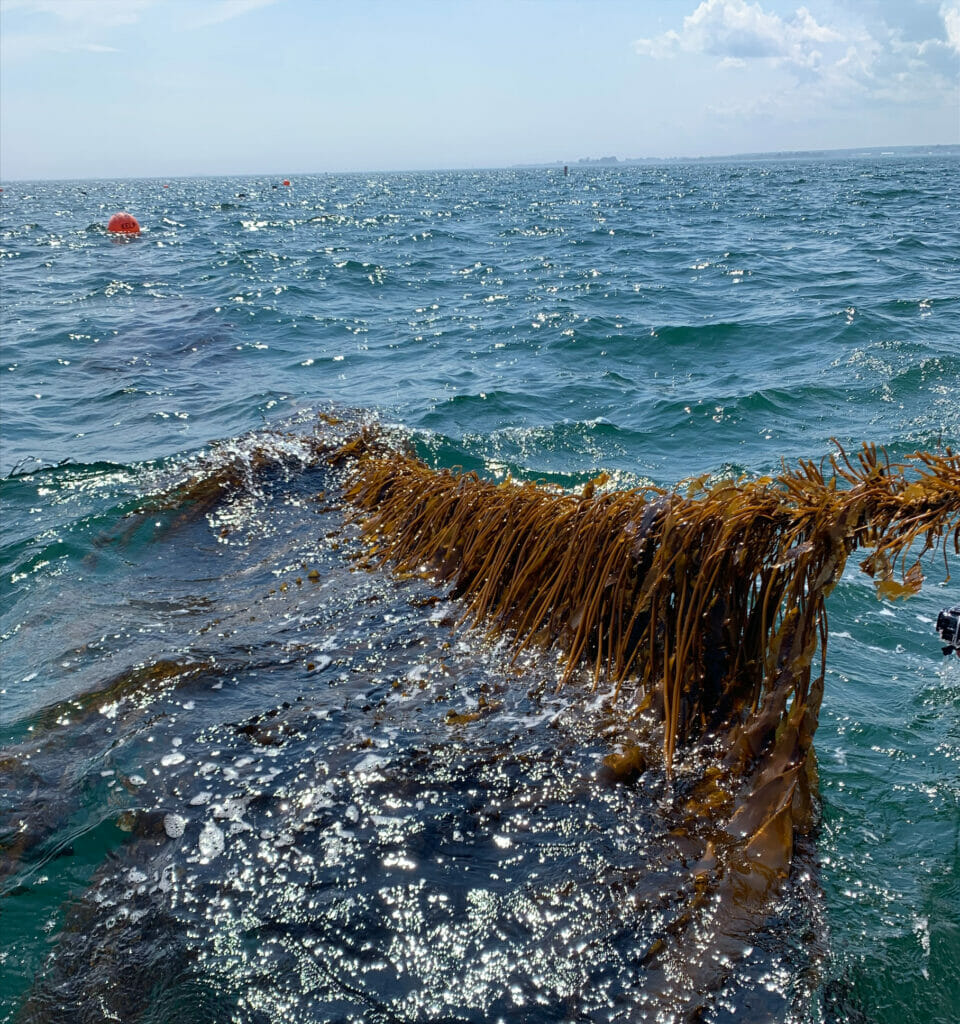Meet The Modern Farmers Drumming Up Demand for Kelp
These New England seaweed farmers formed a cooperative in an effort to share the load of seaweed farming, as well as amp up their marketing efforts.
Meet The Modern Farmers Drumming Up Demand for Kelp
These New England seaweed farmers formed a cooperative in an effort to share the load of seaweed farming, as well as amp up their marketing efforts.

Kelp doesn't require feed or fertilizer to grow, making it an increasingly popular crop for producers. by Sugar Kelp Cooperative
On his boat, surrounded by the Long Island Sound, checking kelp lines is Jonathan McGee’s happy place.
“Growing up, I spent a lot of time on the Sound. I’m a big water person and I’ve always been an environmentalist, so when I learned about the process of cultivating kelp, it didn’t take long for me to say ‘OK, I want to do this,’” says McGee, who has been farming kelp off the coast of Connecticut since 2019.
It led McGee and fellow Connecticut seaweed farmer Suzie Flores to create the Sugar Kelp Cooperative. Officially established in 2022, the Sugar Kelp Cooperative consists of McGee, Flores and four other kelp farms in Connecticut and Rhode Island. Each farmer is a voting member of the cooperative, with an ownership stake, and they’re hoping to grow in 2023 to include farmers in Massachusetts and Maine. “Suzie and I kept talking about marketing and we kept coming up with ideas. We realized we needed to create an entity whose main goal is market generation. To do that, we needed to become a distributor and have year-round supply for it to be sustainable,” says McGee.

In their first two years, Sugar Kelp created the popular New England Kelp Harvest Week, which takes place depending on the harvest season in mid to late April. The eventweek is a way for them to promote sales to restaurants, retail shops such as fish markets and food co-ops and breweries and distilleries, while introducing the general public to new ways to eat kelp.
“It’s really cool to see all the different applications for kelp,” says McGee, adding that he’s looking forward to seeing how a few of the bakeries they’re now selling use kelp.
Overall, McGee says they’ve been happy with the results of New England Kelp Harvest Week, with every participating vendor telling them it was a net profit for their business.
But while they’re hoping to expand kelp week from primarily based in Connecticut to up the Rhode Island shoreline and down into New York in 2023, their biggest goal and challenge is creating year-round supply and demand.
“It’s the difference between being a special on someone’s menu and being a standard,” says McGee.
The cooperative handles everything post-harvest, including marketing, product development and sales efforts, to make sure that the kelp gets where it needs to go. They process the kelp to make it shelf stable for roughly a week, by drying it or blanching and freezing the fresh kelp. Right now, they dry out their kelp in a solar-powered seaweed processing facility. Seaweed farming is becoming increasingly popular for its potential to help mitigate climate change while supporting working waterfronts and providing people with healthy food. Kelp doesn’t require external inputs such as feed or fertilizer to grow, it doesn’t require fresh water or land, and it doesn’t produce methane emissions. But while seaweed farming is growing, getting permits to farm can be a long and arduous process.
“Our regulations are quite robust and for good reason,” says McGee. “But it means there’s a good amount of oversight from the beginning when creating a site.
McGee had identified four potential sites for kelp farming before finally getting approval. And after a site is found and permitting given, kelp farmers still have to have their seaweed tested annually for food consumption, something that the cooperative helps the farmers do.
For farmers like McGee to keep growing it, they have to be able to sell it. While seaweed has long been farmed and consumed throughout the world, the industry is relatively young in the U.S., with farmers working to create a demand for their project.
Creating that year-round supply will also allow the Sugar Kelp Cooperative to invest in processing on a larger scale and survive potential weather disruptions or crop failures.
Passionate that farmers should be able to make a living wage and that growing kelp should leave the local waterways and the planet better, the Sugar Kelp Cooperative is part of a growing trend of aquaculture farmers forming cooperatives to make it feasible for more farmers to regeneratively farm the ocean.
Follow us
This work is licensed under a Creative Commons Attribution-NoDerivatives 4.0 International License.
Want to republish a Modern Farmer story?
We are happy for Modern Farmer stories to be shared, and encourage you to republish our articles for your audience. When doing so, we ask that you follow these guidelines:
Please credit us and our writers
For the author byline, please use “Author Name, Modern Farmer.” At the top of our stories, if on the web, please include this text and link: “This story was originally published by Modern Farmer.”
Please make sure to include a link back to either our home page or the article URL.
At the bottom of the story, please include the following text:
“Modern Farmer is a nonprofit initiative dedicated to raising awareness and catalyzing action at the intersection of food, agriculture, and society. Read more at <link>Modern Farmer</link>.”
Use our widget
We’d like to be able to track our stories, so we ask that if you republish our content, you do so using our widget (located on the left hand side of the article). The HTML code has a built-in tracker that tells us the data and domain where the story was published, as well as view counts.
Check the image requirements
It’s your responsibility to confirm you're licensed to republish images in our articles. Some images, such as those from commercial providers, don't allow their images to be republished without permission or payment. Copyright terms are generally listed in the image caption and attribution. You are welcome to omit our images or substitute with your own. Charts and interactive graphics follow the same rules.
Don’t change too much. Or, ask us first.
Articles must be republished in their entirety. It’s okay to change references to time (“today” to “yesterday”) or location (“Iowa City, IA” to “here”). But please keep everything else the same.
If you feel strongly that a more material edit needs to be made, get in touch with us at [email protected]. We’re happy to discuss it with the original author, but we must have prior approval for changes before publication.
Special cases
Extracts. You may run the first few lines or paragraphs of the article and then say: “Read the full article at Modern Farmer” with a link back to the original article.
Quotes. You may quote authors provided you include a link back to the article URL.
Translations. These require writer approval. To inquire about translation of a Modern Farmer article, contact us at [email protected]
Signed consent / copyright release forms. These are not required, provided you are following these guidelines.
Print. Articles can be republished in print under these same rules, with the exception that you do not need to include the links.
Tag us
When sharing the story on social media, please tag us using the following: - Twitter (@ModFarm) - Facebook (@ModernFarmerMedia) - Instagram (@modfarm)
Use our content respectfully
Modern Farmer is a nonprofit and as such we share our content for free and in good faith in order to reach new audiences. Respectfully,
No selling ads against our stories. It’s okay to put our stories on pages with ads.
Don’t republish our material wholesale, or automatically; you need to select stories to be republished individually.
You have no rights to sell, license, syndicate, or otherwise represent yourself as the authorized owner of our material to any third parties. This means that you cannot actively publish or submit our work for syndication to third party platforms or apps like Apple News or Google News. We understand that publishers cannot fully control when certain third parties automatically summarize or crawl content from publishers’ own sites.
Keep in touch
We want to hear from you if you love Modern Farmer content, have a collaboration idea, or anything else to share. As a nonprofit outlet, we work in service of our community and are always open to comments, feedback, and ideas. Contact us at [email protected].by Bridget Shirvell, Modern Farmer
January 3, 2023
Modern Farmer Weekly
Solutions Hub
Innovations, ideas and inspiration. Actionable solutions for a resilient food system.
ExploreExplore other topics
Share With Us
We want to hear from Modern Farmer readers who have thoughtful commentary, actionable solutions, or helpful ideas to share.
SubmitNecessary cookies are absolutely essential for the website to function properly. This category only includes cookies that ensures basic functionalities and security features of the website. These cookies do not store any personal information.
Any cookies that may not be particularly necessary for the website to function and are used specifically to collect user personal data via analytics, ads, other embedded contents are termed as non-necessary cookies.
It’s incredible to see how the Sugar Kelp Cooperative works to create a successful, sustainable, and environmentally friendly kelp farming industry. It’s inspiring to see the dedication and hard work that the farmers have put in to make this happen. I’m looking forward to seeing what the future holds for cooperative and kelp farming!
Why do I feel sure that they are not “farming”? History has shown that east coast yankee’s only know how to extract and exploit an existing niche. Are these “farmers” leaving natural kelp beds untouched?